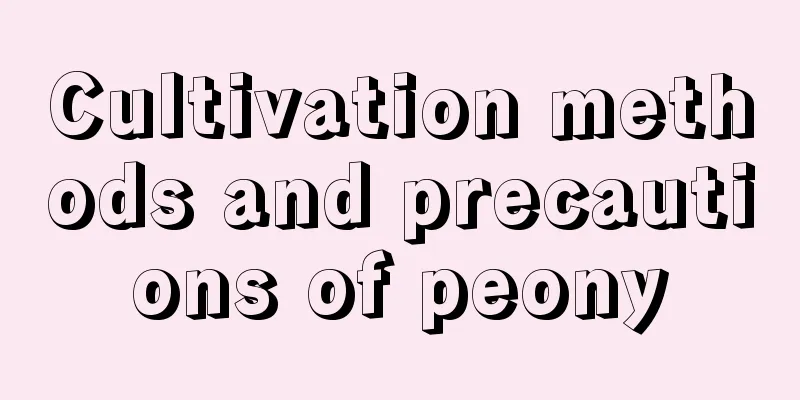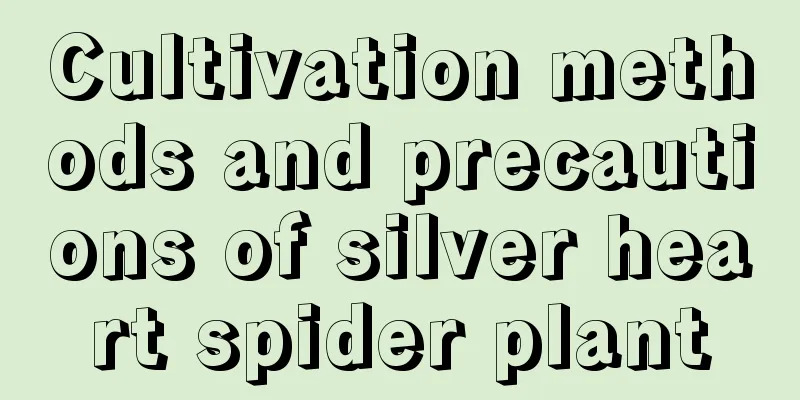Cultivation methods and precautions of peony

1. Breeding methods1. Soil: If you want to grow peony well, soil is very important. Choose loose, fertile soil with good drainage. When breeding, you can add an appropriate amount of river sand and base fertilizer to the humus or peat soil to improve drainage and nutrients, which is more beneficial for later growth. 2. Fertilization: After entering the growth period, the demand for nutrients is relatively high, so fertilizer must be applied to supplement the nutrients. Generally, fertilizer should be applied every 10 to 15 days. It must be a thin fertilizer and the concentration should not be too high to avoid burning the roots. 3. Watering: It is suitable for growing in a humid environment and is not drought-resistant. Therefore, water frequently during the breeding period to maintain moisture. But be careful not to apply too much each time, and do not allow water to accumulate in the soil, otherwise the roots will easily rot. 4. Light: It likes semi-shaded environment and cannot be exposed to the sun or placed in a dark place for a long time. It should be placed outdoors in a place with scattered light, and blocked in time during strong summer sunlight to avoid sunburn. 5. Pests and diseases: If the environment provided during maintenance is not suitable, the plants will be easily infected by pests and diseases. The most common disease is leaf spot. When found, the diseased leaves should be removed, burned, and sprayed with mancozeb. Common insect pests are scale insects, which are mainly caused by poor ventilation and lack of light. You need to increase light and ventilation, and spray pesticides when the situation is serious. 2. PrecautionsDuring the breeding period, we should not only provide it with an environment conducive to its growth, but also pay attention to pruning. It will enter a dormant stage during the high temperatures in summer. At this time, the dead branches should be cut off in time to improve ventilation and light conditions, which can also promote more concentrated nutrients. Shaping and pruning should also be done after the leaves fall in winter. |
<<: When is the best time to plant potatoes?
>>: When is the best time to plant spring soybeans?
Recommend
When and how to plant dandelions
Dandelion Planting Time Dandelions are best sown ...
How much is a pound of bananas? Banana pictures
1. How much is one pound The price of bananas is ...
How to grow sundew well
Sundew Growing Conditions The suitable growth tem...
What kind of vegetables are suitable for growing in glass greenhouses (What kind of vegetables are suitable for growing in greenhouses)
Glass greenhouse vegetable planting The glass gre...
How to trim water bamboo to look good
When is the right time to prune water bamboo? Wat...
How to propagate cherries and what to pay attention to
Cherry breeding method The main ways of cherry pr...
Can the fortune tree be transplanted in autumn? What season is best for transplanting?
Can the fortune tree be transplanted in autumn? T...
In which month should lotus be planted in the north?
Bowl lotus is a flower plant with good ornamental...
How to Make Ranunculus Bloom Faster
1. Transplant at the right time When it has 3 to ...
When is the best time to plant sea buckthorn trees?
The best time to plant sea buckthorn trees Seabuc...
How to keep cabbage seeds, seed germination and planting methods
How to save cabbage seeds Cabbage is also called ...
What are the medicinal herbs that can be planted and harvested in one year?
The price of medicinal materials is good now. The...
How to grow succulent plants Ruby
1. Breeding conditions 1. Soil: This plant prefer...
What should I pay attention to when transplanting green radish from soil to water?
1. Transplantation Method 1. Roots: Do not add wa...
How to maintain champagne roses
1. Use water rationally Normally, if we use water...









